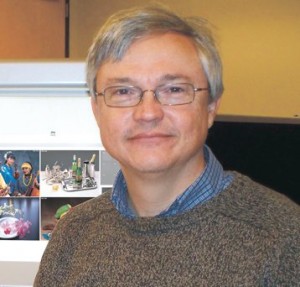The great pace of scientific discovery in recent decades gives us more reason to find wonder and inspiration in God’s creation than in past centuries. Yet, we risk disconnecting from faith and life if we focus only on technological advances without also embracing our humanity, according to Chris Edge, author of the new book, “Cosmology and the Cross.”

“If one allows it to, living a very technically oriented day to day life can make one feel estranged from God or estranged from something that isn’t [of a] ‘by the numbers’ kind of attitude,” said Edge, a Nativity of Our Lord parishioner who has a doctorate degree in atomic physics. He works in digital color imaging for Eastman Kodak.
Using examples from the world of science and his own life and career, he seeks to demonstrate — especially to those working or studying in scientific, technical and professional fields — the integration of science and faith, and at the same time the need for balance of love and relationships.
The Catholic tradition furthers that integration by valuing the pursuit of knowledge, even though the Church has sometimes made mistakes in its treatment of scientists and their advances, as recently highlighted in the revised version of the TV show made famous by astronomer Carl Sagan: “Cosmos: A Spacetime Odyssey.”
There is no conflict in accepting both faith and science, Edge writes: “There is no loss in scientific integrity by saying that the scientists and the theologians are both right. Our physical existence is the result of scientific laws and phenomena. Our physical existence is part of an amazing process quietly guided and ushered by the hand of God. Both statements are true.”
Modern parables could be told about the scientific discoveries of our time, he said. “All of reality really is illustrative of what God does, whether that’s sheep or wheat in the field, or the discovery of relativity or of anti-matter even before it had been observed physically, Edge said. “All these things are pretty amazing and wonderful.”
We might be tempted to feel that God is irrelevant or that faith is somehow superstition in light of scientific advances, he said. The “reality is that all that’s really done is giving us new eyes that are able to see things that our ancestors could never see — whether it was things far away or things microscopically — and to see how incredibly wondrous and complex and amazing this universe is.”
Scientists already live by faith, as they trust in scientific concepts, he said. The best way to demonstrate how faith and science are integrated is to live this integration, said Edge, who hopes readers take away the need to live a well-rounded life with love and relationships, not merely science.
Raised in a scientific- and academically-focused family, (Edge’s father and daughter also have doctorate degrees in physics), he became a Christian in high school, influenced by the writings of C.S. Lewis. Edge credits his introduction to Christianity and later Catholicism with helping him have both a successful career and a balanced life.
“We can be inspired to live our lives well and not become disconnected because of technology, but rather to always allow it to be a mechanism for serving God and therefore to be connected.”
In Catholicism, Edge found the integration of faith and reason through the work of St. Thomas Aquinas and others. Modern society would benefit from integrating the philosophy of science with faith in a similar way, he said.
Edge acknowledged that Church leaders haven’t always accepted scientific discovery, and he is grateful for efforts like those of Pope John Paul II to ask forgiveness for the treatment of scientists such as Galileo.
However, he noted, “just because mistakes are made doesn’t mean that the core reality isn’t still the core reality of the faith. Mistakes have been made, but also there’s been huge inspiration. And some of the great early scientists were by no means negative about impeding science.”
The Church has done much to support the wonder of science, Edge said. “To me, personally, it’s been a great support to my life as a scientist.”
To purchase Edge’s book online, visit http://www.CosmologyAndTheCross.com.



